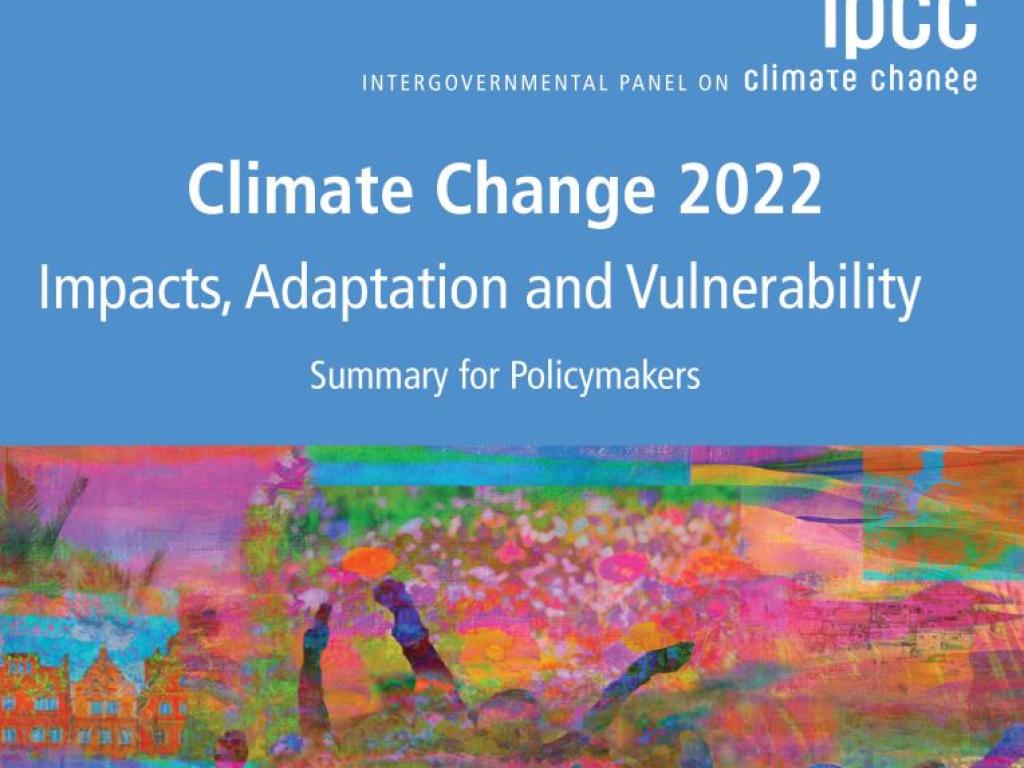ACDI researchers contribute to the IPCC AR6 Working Group II climate report

February saw the release of the latest climate report from the Intergovernmental Panel on Climate Change (IPCC) Working Group II, titled Climate Change 2022: Impact, Adaptation and Vulnerability. The report assesses the impacts of climate change on ecosystems, biodiversity and human communities at a global and regional level. Working Group II also looks at the vulnerabilities of ecosystems and human societies, and the capacity to adapt to climate change. There is a focus in this report on solutions and adaptation on the ground.
In a recent webinar hosted by ACDI and Stellenbosch University, Prof Bruce Hewitson (Director of CSAG and lead author from WGI) explained that previously the climate reports have been around providing evidence that climate change is a persistent threat and highlighting the potential scenarios in terms of future climate change. This most recent report now focuses on how communities may need to adapt to the consequences of these changes, what changes are already being felt and how this may accelerate in the decades to come.
“The science is clear that climate change is a threat to human wellbeing and the health of the planet. Climate change impacts are becoming more complex and more difficult to manage. To avoid mounting losses, urgent action is required to adapt to climate change, at the same time as making rapid, deep cuts in greenhouse gas emissions. Any further delay in concerted global action will miss a brief and rapidly closing window to secure a liveable future,” says Dr Christopher Trisos, coordinating lead author for Chapter 9: Africa.
Implications for Africa and the importance of context
Several ACDI researchers were nominated to contribute to the Working Group II report, with many of our researchers being instrumental in putting together Chapter 9: Africa which highlighted the continent for the benefit of African and global policy makers.
“This report provides the strongest evidence to date that key development sectors in Africa are already experiencing widespread losses and damages attributable to human-caused climate change, including: biodiversity loss, water shortages, reduced food production, loss of lives, and reduced economic growth. This is a cause for deep concern on the issue of climate justice, as many African countries that have contributed very little to the greenhouse gas emissions driving climate change are already suffering from negative climate change impacts,” says Dr Christopher Trisos.
The report further highlights the importance of context specific evidence and action as many of the vulnerabilities of ecosystems and people differ among and within regions, and are driven by intersecting patterns of socio-economic development and environmental variability. “It is clear that we have to pay more attention to the social aspects of climate adaptation. Technical and physical interventions are insufficient without understanding the social, cultural, institutional and governance context and opportunities,” explains Associate Professor Gina Ziervogel, ACDI affiliate and lead author for Chapter 6: Cities, Settlements and Key Infrastructure.
After a recent webinar hosted by World Resources Institute, Gina Ziervogel further stated, “We need to focus more on understanding social issues impacting low-income households. As the cities chapter points out in the section on equity and justice of urban infrastructure, many low-income households have actually been made worse-off by urban adaptation that has not considered diverse needs sufficiently, yet these are the very people most exposed to urban climate impacts”
Enabling climate risk management
Chapter 17 of the report, led by Mark New, focused on options for climate risk management. “There is evidence that there are a set of enabling conditions that support climate adaptation responses across different levels of society, including knowledge and human capacity, financial resources, governance and regulations, as well as social action. Where these don’t exist, responding to climate change becomes much harder, and in many African settings, this is the case. Dealing with climate change effectively is intricately coupled to the capabilities needed for sustainable development in general, and action on climate change in Africa is therefore a win-win with broader socio-economic development agendas”.
Opportunities for action
This latest report provides detailed evidence of how ecosystems and communities are affected by climate change. However, importantly the report also provides opportunities for practical action that will help these ecosystems and communities adapt and potential mitigate changes in climate at both a regional and global level.
“The report makes clear that every increment of increase in global warming increases the risks to African people and ecosystems. It shows that limiting global warming to 1.5°C will substantially reduce climate change damages to African economies, agriculture, human health, and ecosystems,” explains Trisos, “It also highlights major opportunities for accelerating action to adapt to climate change in Africa by increasing finance for adaptation, increasing finance for African-led climate research, strengthening governance, strengthening social protection programs, using ecosystem-based approaches to adapt to climate change, and prioritising adaptation efforts towards those who are most vulnerable, such as people living in informal settlements.”
For more information on the latest climate report please see the following resources relating to the release of the IPCC ARG WGII climate report
Read the full IPCC AR6 WGII report
View the IPCC AR6 WGII factsheet for Africa
View the IPCC AR6 WGII factsheet for Biodiversity
View the IPCC AR6 WGII factsheet for Human Settlements
View the webinar series by World Resources Institutes – Turning Science into Adaptation Action: Event Series on the IPCC WGII Report by the Adaptation Action
ACDI researchers/affiliates contributing to WGII of the IPCC’s 6th Assessment Report
Prof Gina Ziervogel: Lead author – WGII Chapter 6
Dr Christopher Trisos: Coordinating lead author – WGII Chapter 9
Dr Chris Lennard: Lead author – WGII Chapter 9
Dr Nick Simpson: Lead author – WGII Chapter 9
Birgitt Ouweneel: Contributing author - WGII Chapter 9
Luckson Zvobgo: Chapter scientist – WGII Chapter 9
Luleka Dlamini: Contributing author – WGII Chapter 9
Prof Mark New: Coordinating lead author – WGII Chapter 17
Dr Megan Lukas-Sithole: Chapter scientist – WGII Chapter 17